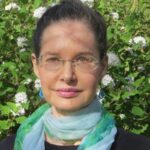 I have struggled with chronic pain for the past 30 years. I’ve been diagnosed with fibromyalgia and Ehlers-Danlos syndrome. But I believe another factor contributing to my pain has been past trauma and the resultant tendency to dissociate from my body.
I have struggled with chronic pain for the past 30 years. I’ve been diagnosed with fibromyalgia and Ehlers-Danlos syndrome. But I believe another factor contributing to my pain has been past trauma and the resultant tendency to dissociate from my body.
I have always been inclined to dreaminess, which I view as a positive aspect of dissociation. But this propensity turned to body dissociation at age 16 after I was sexually assaulted. At the time, I told no one. As I fortunately suffered no significant physical injury, I did my best to move forward and just forget. But I developed a ravenous appetite, eating way beyond my body’s natural satiety cues. In little more than a month after the incident, I gained forty pounds. I was lost, anxious, depressed and filled with self-loathing, especially for my body. I stopped socializing with friends, effectively withdrawing from normal adolescent life.
I lived in my head. I focused on academics and excelled. My intellectual life gave me a compensatory albeit still fragile source of self-esteem. When I left home for college a few years later, I viewed this as an opportunity to break from the past. I lost the extra weight, which felt freeing at first. But not having dealt with the underlying trauma, I fell into disordered eating. My weight would fluctuate wildly throughout my 20s, further confounding any sense of integrated body-mind identity.
Chronic pain set in by age 30. With no truly helpful diagnosis or solution from either mainstream or alternative medicine, I fell into years of denial. I minimized my symptoms and pushed through the pain, worsening the syndrome. My preoccupied mind and “spaciness” also made me accident prone, and then neglectful of any resulting injuries. I fractured a vertebra in a horseback riding incident at age 40. I convinced myself it was just muscle pain, ignoring it until it was too late to treat. While the injury has greatly exacerbated my body-wide pain, I am fortunate that the consequences were not worse.
Chronic pain itself compounds dissociation. You must learn to live with and disregard it to a certain extent. The challenge comes in discerning those aches or pains that can be tolerated and safely disregarded from those indicating a true need for attention and treatment.
Work through 12-step programs has allowed me to have a healthy relationship with food and my body. I will always be a “heady” person. I enjoy the life of the mind and spirit. But I acknowledge today that I also have a body. A body that, despite decades of pain and struggles, has kept me going for 60 years. I often thank my body for all it does, and sometimes apologize to it for past abuse and neglect. Above all, I cherish and love it.
My current pain level prevents me from engaging in much physicality. But I stay grounded with healthy foods, relaxation, deep breathing and meditation. I address emotions by journaling, talking with friends, and exploring spirituality. The latter provides me with essential perspective. In expanding my awareness away from current fears and pain, I’m reminded that there is much good in my life, and that no matter how physically limited I may be, I can still be of service to others and this world. I can reach out, I can share through writing. I can pray. I pray for those who are struggling or suffering, and for this planet as a whole.
God/the universe loves me and wants me here right now. I am exactly where I need to be. I am exactly who I should be in this moment. I am not broken and never was. I have much to give and much to receive, breathing in and breathing out. It is an honor to hold this moment, and that is all I need to do.
